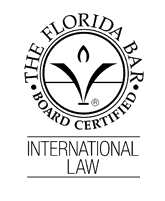Co-Authored by Jennifer Diaz and Kristina Hernandez-Tilson, an attorney in Miami, Florida, practices in state and federal court, litigating matters of civil and administrative law.
Whether you are importing goods to the United States, or are a U.S. trademarks or copyright owner, there is a new law on the books that should be of interest to you, the Trade Facilitation and Trade Enforcement Act of 2015 (TFTE), which was signed into law on February 24, 2016. TFTE, a bipartisan piece of legislation, is comprehensive in scope. In this Article, we will look specifically at Sections 302 through 311, the section on “Import-Related Protection of Intellectual Property Rights” (IPR). The TFTE highlights the fact that CBP treats IPR as a priority trade initiative.
In this previous article, we explained the benefits of taking the extra step of recording your registered trademark or copyright with U.S. Customs and Border Protection (CBP), instead of relying solely on registration of the intellectual property with the U.S. Patent and Trademark Office (USPTO for trademarks), or the U.S. Copyright Office (for copyrights). Initial registration with the USPTO or the U.S. Copyright Office provides only public notice of ownership of the trademark or copyright, whereas taking the extra step of recording that registered trademark or copyright with CBP transforms the intellectual property into one that is now eligible to receive protection from CBP at over 327 U.S. Ports of Entry. Thanks to TFTE, this protection will now be more robust.
Prior to the passage of this Act, CBP was authorized, pursuant to section 818(g) of the 2012 National Defense Authorization Act (NDAA), but not required, to share unredacted images and samples with right holders if CBP suspected a product of infringing an IPR. According to House Report 114-114 – Part 1, which comments on TFTE, giving this discretion to CBP resulted in implementation of section 818(g) of NDAA that did not provide effective enforcement for trademark and copyright holders, and by replacing 818(g) of NDAA with section 302 of TFTE, the Committee intends for CBP to implement the latter in a manner that ensures effective CBP enforcement of IPR. This means greater protection for U.S. right holders, but also more of a need for pre-compliance for importers.
Pursuant to section 302, when CBP suspects merchandise that violates a domestic copyright or trademark is being imported into the United States, it is required to provide the U.S. right holder with certain information, so as to facilitate the right holder in conducting his or her own examination and testing of the merchandise. Specifically, CBP must provide information that appears on the merchandise and its packaging and labels, including unredacted images of the merchandise and its packaging and labels. However, it should be noted that this requirement only kicks in if CBP determines that the examination or testing of the merchandise by the owner of the trademark or copyright would assist CBP in determining if the merchandise is being imported in violation of the IPR. In other words, CBP is still allowed to exercise some discretion. CBP is also permitted to use its discretion in determining whether or not it wants to provide the right holder with actual samples, unredacted, of the merchandise.
As a result of this new law, CBP now has even more power to protect against IPR infringement to assist in identifying and seizing goods that violate U.S. IPR holders. During the recordation process with CBP, a right holder has the opportunity to train CBP on how to detect and identify infringing merchandise. Now, section 308 of the TFTE will ensure that CBP officers are trained effectively to catch the infringers. If counterfeit merchandise is seized and forfeited by CBP, CBP can also impose a penalty of the MSRP value of the infringing goods under the authority found in 19 U.S.C. 1526(f), and discussed in CBP’s own “FP&F Mitigation Guidelines”. The catch however, is that only those companies or individuals whose trademarks have been recorded with CBP enjoy this added benefit. This reinforces our prior advice in the “Top 10 Tips When Importing”, that all who have registered trademarks or copyrights take the extra step of recording those rights specifically with CBP. Only then will right holders enjoy the new protections afforded by TFTE.
It should also be noted that pursuant to subsection (d) of 302, all these requirements and discretionary powers now imposed on CBP are subject to security interests of the United States. CBP may not provide information, photographs, or samples to a right holder if providing such “would compromise an ongoing law enforcement investigation or national security.”
Lastly, it is important to note that TFTE affords these enhanced protections not only to right holders, but even to those who have “submitted an application for registration under Title 17, United States Code, with the United States Copyright Office, to the same extent and in the same manner as if the copyright were registered with the Copyright Office.” Section 304.
Are you now ready to record your registered trademark or copyright with Customs?

